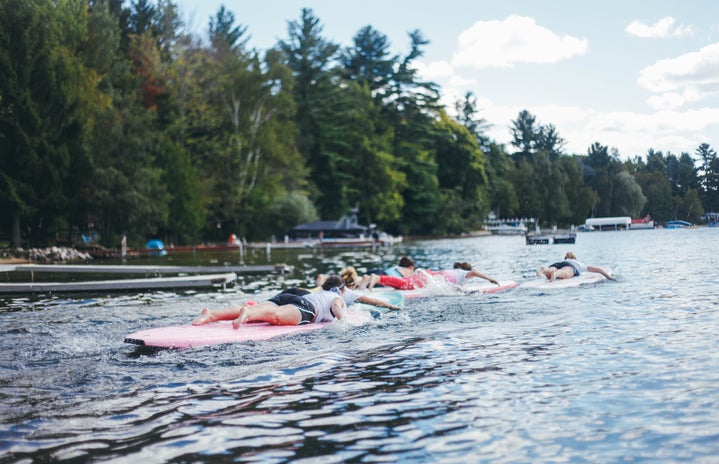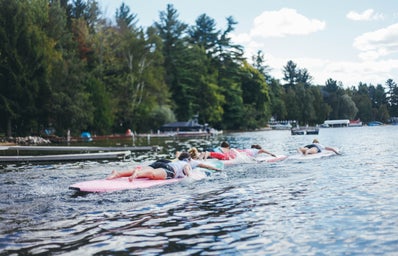I’ve rowed at Seattle Pacific University for almost 3 years now, and here is a day in my life. Each school day starts the night before when I make my overnight oats, pack my school backpack and my rowing backpack, with a change of clothes and my toiletries. I’ve been doing this for almost 3 years and it somehow still takes me about an hour. I’ve gotten my routine down to about 15 minutes if I stay focused, but I do all of this while getting ready for bed, debriefing my day with my roommates, and texting my boyfriend. It can be annoying when I just want to go to sleep, but I know that future Audrey will thank me when she can just get up and go the next day, without thinking about what to wear and what to pack. I try to hit the sheets in the hours of 9-10pm, some days are better than others, and I definitely don’t get enough sleep, but I don’t beat myself up for it. We can’t be perfect all the time.
Off season, in the fall and half of winter quarter, we have a cap of 15 hours a week, which means I have weekends free. Once the season starts around mid February, we add 3 hour Saturday practices, and the cap of hours goes up to 20, but don’t worry, Saturday practices are from 7-10 am, so I get to sleep in a little.
Monday through Friday my alarm goes off at 5:05 am, (with the exception of Wednesday when we have afternoon practice), I snooze it once and roll out of bed at 5:15. It takes me about 10 minutes to get dressed, wash my face, brush my teeth, then I load up my two backpacks on my back and front as my two housemates and I walk down to the shellhouse together at 5:25.
I live in a house with 4 girls, two of which are rowers, and I have loved not walking down alone, which I mostly did Freshman and Sophomore year. It’s about a 7 minute walk, which I enjoy. It gives me some margin to wake up and smell the fresh air before really needing to communicate with anyone. On especially cold days we might drive down, which takes about 2 minutes and kind of makes me laugh, but it is nice not to brave the icy sidewalk.
Practice goes from 6-8:30, but it’s expected that you get there at least by 5:45. We flip our magnetic names on the white board upside down, situated in the lineup for the day, to signify that we are present. Then I usually sit on the couch by our lockers with my heating pad warming my back, eating a granola bar, or some protein bites. At 5:40, two girls head down to sweep the goose poop off the dock, probably the most un-glamorous part of rowing is the water fowl. Geese are especially annoying because they make a mess, and are always in the way. We have a tally on our white board of how many geese are hit during practice because they don’t see our oars coming down the canal and are slow to move. I myself have hit two.
I assign two different girls to sweep the dock every day, so we don’t have to do it too often. At 5:50, we get hands on boats. Because the line-ups are switched up almost every day until later in the season, we have to get the boats down early to make sure our seat matches our personal settings. This mostly involves moving the feet back and forth depending on height, and fixing the spacers in your oarlock that makes the oar sit higher or lower on your body, this depends on the length of your torso.
At 6am, we head to the track for a lap, then finish dynamic stretching inside the shellhouse until about 6:15. Then Coach Caitlin (CC), brings out her small white board and goes over the plan for the day, as the coxswains have already been briefed. As she lays out the practice plan, rowers layer up according to the weather; layering is a daily dilemma that we discuss during warm up because you never want to be outside and freezing, but if you overdo it and have to take clothes off, you will have a lot of layers to carry inside when practice is over. I’ve been asked a few times if we row in the rain. Yes, of course we row in the rain, I live in Seattle, the rain doesn’t stop anyone here. The only weather that might stop us from a water practice are high winds, or temperatures below freezing with rain. That’s right, if it’s below freezing, but no rain and no wind, we will most likely still be out there. Oh, and we’re not allowed to wear gloves, I honestly don’t know why. We launch around 6:30, give or take 10 minutes, and row our little hearts out until 8:15 when we dock, bring the boats in, debrief practice, and go on with our day at 8:30. Three days a week we have a second workout later in the day, which we don’t have to do as an entire team, but with at least one buddy.
It can be really hard to get up every day at the crack of dawn, but by 8:30, the hardest part of my day is over, and I feel really good about getting a hard workout, plus some social time in, before the city really wakes up. If I’m quick about it, I’ll shower at the gym and eat my overnight oats on the way to class, if I have a 9am. However, some professors are quite strict about tardiness and I would rather not risk it, so I show up every day in sweats and a sweatshirt, looking slightly disheveled. One time, a professor made a comment about wearing sweats to class, saying that it’s okay if you rolled out of bed 5 minutes ago, at least you made it on time. At that moment I really wanted everyone to know that I didn’t look this way because I’d been sleeping in, but oh well.
I take the same amount of classes as any student. When you have a busy schedule, you learn quickly how to be efficient with your time. Many student-athletes also have jobs, anywhere from 4-30 hours a week, on top of school and sport. I worked all of last year, but am taking a break right now. I’ve learned that a busy schedule can look daunting, but I’m constantly surprised at how humans can rise to the occasion when challenged. But it’s also okay to take a step back and give yourself more opportunities to rest.
I walked onto the rowing team Freshman year, not knowing how much it would shape my college experience and my life. Rowing has taught me discipline, team-work, leadership, and trust like no other sport, and it has given me the greatest community of hard-working women I could have asked for. Some days, when I feel so cozy in my bed I don’t want to get up, I remember that 30 other women are doing the same thing as me and it keeps me going.
As much as rowing is more than a part-time job, and takes a lot of my physical and mental energy, it is not my whole life. I find time to go hiking, rock-climbing, and even write for this magazine. I host a radio show for 1 hour a week with a non-rowing friend where we make themed setlists. I keep up with my studies, and have TAed for a few Economics classes, and I generally enjoy my majors (political science and economics). The main cost of rowing is spontaneity. High school me used to dream of those late night ice-cream runs, movie nights on a weekday, or short notice weekend trips. And although I’ve done a few of these spontaneous adventures, I’ve hung back while my non-rowing friends do much more. Sometimes I decide that it’s worth it to stay out late and make some memories instead of getting to bed on time, but I can’t do it every night. I weigh every decision in regards to rowing, and sometimes it feels easy, while other times it feels like a big sacrifice. When it gets hard and I find myself thinking too much about the NARP life (Non-Atheltic Regular Person), I remember that anyone at my school can go to that party, or this event, but only the 30 girls on my team will get this specific experience of college rowing. I’ve also suffered a rather major injury from my few years in college rowing, and from some perspectives, I’ve missed out on the regular college experience. If I could go back, though, I wouldn’t change a thing. Rowing has redefined healthy competition, taught me character skills I could not learn in a classroom, and given me some really strong muscles. I love rowing and I love my team, and hopefully, this article gives people more appreciation for the work, instead of the talent.


